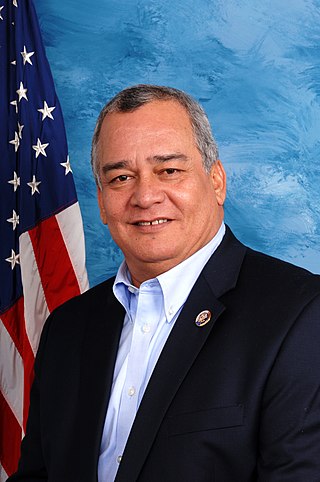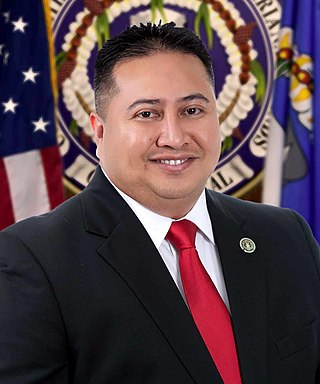
Juan Nekai Babauta is a Northern Mariana Islander politician who served as the sixth governor of the Northern Mariana Islands from January 14, 2002, to January 9, 2006.

The 2005 Northern Mariana Islands general election was held on Saturday, 5 November 2005. Voters in the Northern Mariana Islands voted for the Governor of the Northern Mariana Islands, the non-voting delegate to the United States House of Representatives, attorney general, 6 seats in the Northern Mariana Islands Senate, all eighteen seats in the Northern Mariana Islands House of Representatives, 3 mayors, seats for the municipal council, seats for the board of education, 2 justices, and a judges. There was also a referendum on calling a Constitutional Convention, which was approved by voters.

Benigno Repeki Fitial is a Northern Marianan politician who served was the seventh governor of the Northern Mariana Islands. The second longest-serving governor in CNMI history, Fitial was elected on November 6, 2005, assumed office on January 9, 2006, and was re-elected to a (five-year) second term in 2009. He was impeached by the CNMI House of Representatives on February 11, 2013, and was scheduled to face trial before the CNMI Senate to determine if he should be removed from office. He resigned on February 20, 2013, after 7 years, 1 month, and 11 days in office.

The Northern Mariana Islands' at-large congressional district encompasses the entire U.S. Commonwealth of the Northern Mariana Islands (CNMI). The territory does not have a voting member of Congress, but does elect a delegate who can participate in debates with the United States House of Representatives. On November 4, 2008, the first delegate was elected to the 111th United States Congress which began on January 3, 2009.

Gregorio Kilili Camacho Sablan is a Northern Mariana Islander politician and former election commissioner. Elected in 2008, Sablan became the first delegate to the United States House of Representatives from the Commonwealth of the Northern Mariana Islands.

General elections were held in the Northern Mariana Islands on Saturday, November 7, 2009. Voters in the Northern Mariana Islands voted for the Governor of the Northern Mariana Islands, 6 seats in the Northern Mariana Islands Senate, all twenty seats in the Northern Mariana Islands House of Representatives, 4 mayors, seats for the municipal council, and seats for the board of education. Additionally, a referendum was held.
Heinz Sablan Hofschneider is a politician from the Northern Mariana Islands. Hofschneider served as the Speaker of the Northern Mariana Islands House of Representatives from 2002 to 2004 and is a four-time candidate for Governor of the Northern Mariana Islands.

The 2010 Congressional election in the Northern Mariana Islands occurred on November 2, 2010 and elected the territory's Delegate to the United States House of Representatives. Representatives and non-voting Delegates are elected for two-year terms; the elected will serve in the 112th Congress from January 3, 2011 until January 3, 2013.
Jesus "Jesse" Camacho Borja is a Northern Mariana Islander politician and lawyer who served as the fourth lieutenant governor of the Northern Mariana Islands from January 10, 1994 until January 12, 1998 under former Democratic Governor Froilan Tenorio.

The 2012 Congressional election in the Northern Mariana Islands was held on November 6, 2012 to elect the territory's sole Delegate to the United States House of Representatives. Representatives and non-voting Delegates are elected for two-year terms.

The 2012 Northern Mariana Islands general election were held on Tuesday, 6 November, 2012. The election coincided with the 2012 United States general elections. Voters in the Northern Mariana Islands voted for the non-voting delegate to the United States House of Representatives, 3 seats in the Northern Mariana Islands Senate, all twenty seats in the Northern Mariana Islands House of Representatives, 4 mayors, seats for the municipal council, seats for the board of education, and 2 judges. Additionally, three referendums were held.

The 2014 Northern Mariana Islands general election were held on Tuesday, 4 November, 2014. The election coincided with the 2014 United States midterm elections. Voters in the Northern Mariana Islands voted for the governor of the Northern Mariana Islands, the non-voting delegate to the United States House of Representatives, attorney general, 6 seats in the Northern Mariana Islands Senate, all twenty seats in the Northern Mariana Islands House of Representatives, 4 mayors, seats for the municipal council, and seats for the board of education. Additionally, a referendum involving changes to the constitution was held.

The 2018 United States House of Representatives election in the Northern Mariana Islands was held on Tuesday, November 13, 2018, to elect the territory's Delegate to the United States House of Representatives in the 116th United States Congress. Delegate Gregorio Sablan was re-elected to his sixth term as Delegate to the U.S. House of Representatives from the Northern Mariana Islands' at-large district.
Angel Aldan Demapan is a Northern Mariana Islands politician affiliated with the Republican Party.

The 2018 Northern Mariana Islands general election were held on Tuesday, 13 November 2018. Originally scheduled to take place on Tuesday, 6 November 2018, to correspond with the 2018 United States midterm elections, the elections were delayed by one week due to the impact and aftermath of Typhoon Yutu. Early voting was held from Tuesday, 6 November, until Monday, 12 November 2018. An estimated 18,975 voters were eligible to vote in the 2018 election.

The 2022 United States House of Representatives election in the Northern Mariana Islands was held on Tuesday, November 8, 2022, to elect the territory's delegate to the United States House of Representatives in the 118th United States Congress. The delegate, who is elected to a two-year term, represents the Northern Mariana Islands' at-large congressional district in the U.S. House of Representatives.

The 2022 Northern Mariana gubernatorial election took place on November 8, 2022, to elect the governor of the Northern Mariana Islands and the lieutenant governor of the Northern Mariana Islands to a four-year term in office. Because no candidate received 50% of the vote in the general election, the two highest-placing candidates advanced to a runoff election on November 25, 2022.

The 2024 United States House of Representatives election in the Northern Mariana Islands was held on Tuesday, November 5, 2024, to elect the territory's delegate to the United States House of Representatives in the 119th United States Congress. The Delegate, who is elected to a two-year term, represents the Northern Mariana Islands' at-large congressional district in the U.S. House of Representatives.

The 2020 Northern Mariana Islands general election were held on Tuesday, 3 November, 2020, corresponding with the 2020 United States general elections. Voters in the Northern Mariana Islands voted for the non-voting delegate to the United States House of Representatives, 3 seats in the Northern Mariana Islands Senate, all twenty seats in the Northern Mariana Islands House of Representatives, seats for the municipal council, seats for the board of education, 1 justice, and 2 judges.

The 2022 Northern Mariana Islands general election were held on Tuesday, 8 November 2022, corresponding with the 2022 United States general elections. Voters in the Northern Mariana Islands voted for the Governor of the Northern Mariana Islands, the non-voting delegate to the United States House of Representatives, attorney general, 6 seats in the Northern Mariana Islands Senate, all twenty seats in the Northern Mariana Islands House of Representatives, 4 mayors, seats for the municipal council, seats for the board of education, a justice, and 2 judges.
















